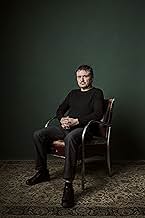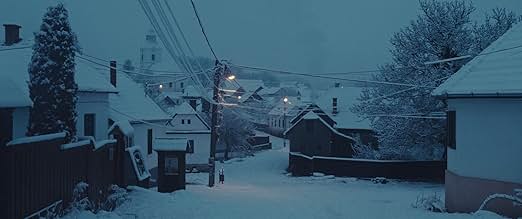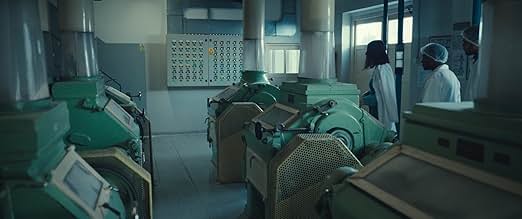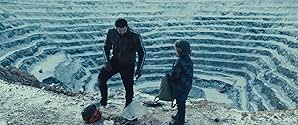NOTE IMDb
7,2/10
6,3 k
MA NOTE
Une analyse sans jugement des moteurs du comportement humain face à l'inconnu, de la façon dont on perçoit l'autre et de son rapport à un futur qui inquiète.Une analyse sans jugement des moteurs du comportement humain face à l'inconnu, de la façon dont on perçoit l'autre et de son rapport à un futur qui inquiète.Une analyse sans jugement des moteurs du comportement humain face à l'inconnu, de la façon dont on perçoit l'autre et de son rapport à un futur qui inquiète.
- Réalisation
- Scénario
- Casting principal
- Récompenses
- 7 victoires et 18 nominations au total
Endre Rácz
- Tibi
- (as Rácz Endre)
Avis à la une
Cristian Mungiu is one of the "founding fathers" of the Romenian new wave that started around 2005 with movies such as "The death of Mr Lazarescu" (2005, Cristi Puiu), "12:08 East of Bucharest" (2006, Corneliu Porumboiu) and of course the breakthrough movie of Mungiu himself "4 month, 3 weeks and 2 days" (2007). More than 15 years later the Romenian new wave is still alive and kicking. In 2022 the experienced director Mungiu delivers an excellent movie with "R. M. N" but there is also the "new name" Alexandru Belc with "Metronom". New name is maybe a bit exaggerated because Belc already contributed to the script of "4 month, 3 weeks and 2 days".
"Metronom" is situated in 1972 during the Ceausescu years and is thus typical Romenian. "R. M. N" covers more general themes. It is about Matthias (Marin Grigore) and his home village. After working in Germany for a while Matthias returns to his home village. In this village three Sri Lankan workers arrive at the local bakery because vacancies are difficult to fill (many workers work in the West). The arrival of the Sri Lankan workers leads to a lot of tension in the local community.
The above description seems to indicate that "R. M. N" is above all about racism, and that is not entirely untrue. In a key scene with a duration of twenty minutes there is a meeting in the village hall. In this meeting all prejudices against the Sri Lankan (and foreigners in general) are given free reign.
In my opinion "R. M. N" is about racism but not only about racism. It is also about hypocrisy. I give a number of examples.
In the first place Romanians working in Germany is no problem, but a Sri Lankan working in Romania is.
The film is situated in Transsylvania, a region with a Hungarian minority. This minority wants not to be discriminated against, but on the other hand has no problem discriminating other people.
There are also people defending the Sri Lankan workers, but this are their employers that have an economic interest. Their defence that no Romenian reacted on the vacant positions meets with the reply that they were only willing to pay minimum wages. So their bevaviour has at least a hint of hypocrisy to it. They are certainly not the good guys against the evil and dumb majority. In the films of Mungiu there seldom is a simplistic good versus bad distinction. In this respect the portrayel of one of the empoyers (Csilla Szabo played by Judith State) as always drinking a glass of red wine and always playing the cello was already a bit too "bourgeois" to my liking.
The village of the movie is situated on the edge of a primaeval forest. This is no coincidence as the forest symbolizes mystical and animal spirits, with recurring references to brown bears. These animal spirits overtake rational thought when it comes to reacting to foreigners. This is illustrated in the meeting in the village hall (in the scene already mentioned to) when some villagers tried to wrap their prejudices in rational arguments (maybe the foreigners carry unknown viuses with them). When their argument is refuted (we let them work with protecting rubber handshoes) the prejudice inside shows itself (but we simply don't want them here).
"R. M. N" is an ominous film with mob violence constantly in the air. In this respect it resembles "Werckmeister Harmoniak" (2000, Bela Tarr), although the last mentioned film is more abstact. The resemblance was for me the most obvious in the new years day parade with people in bear costumes fighting a neighbouring village as part of a new year tradition. For me this scene was the most Tarr like combining in an abstract manner animal spirits with xenophobia. The twenty minutes scene in the village hall did the same thing, but in a much more concrete way. This scene is more characteristic of Cristian Mungiu himself.
"Metronom" is situated in 1972 during the Ceausescu years and is thus typical Romenian. "R. M. N" covers more general themes. It is about Matthias (Marin Grigore) and his home village. After working in Germany for a while Matthias returns to his home village. In this village three Sri Lankan workers arrive at the local bakery because vacancies are difficult to fill (many workers work in the West). The arrival of the Sri Lankan workers leads to a lot of tension in the local community.
The above description seems to indicate that "R. M. N" is above all about racism, and that is not entirely untrue. In a key scene with a duration of twenty minutes there is a meeting in the village hall. In this meeting all prejudices against the Sri Lankan (and foreigners in general) are given free reign.
In my opinion "R. M. N" is about racism but not only about racism. It is also about hypocrisy. I give a number of examples.
In the first place Romanians working in Germany is no problem, but a Sri Lankan working in Romania is.
The film is situated in Transsylvania, a region with a Hungarian minority. This minority wants not to be discriminated against, but on the other hand has no problem discriminating other people.
There are also people defending the Sri Lankan workers, but this are their employers that have an economic interest. Their defence that no Romenian reacted on the vacant positions meets with the reply that they were only willing to pay minimum wages. So their bevaviour has at least a hint of hypocrisy to it. They are certainly not the good guys against the evil and dumb majority. In the films of Mungiu there seldom is a simplistic good versus bad distinction. In this respect the portrayel of one of the empoyers (Csilla Szabo played by Judith State) as always drinking a glass of red wine and always playing the cello was already a bit too "bourgeois" to my liking.
The village of the movie is situated on the edge of a primaeval forest. This is no coincidence as the forest symbolizes mystical and animal spirits, with recurring references to brown bears. These animal spirits overtake rational thought when it comes to reacting to foreigners. This is illustrated in the meeting in the village hall (in the scene already mentioned to) when some villagers tried to wrap their prejudices in rational arguments (maybe the foreigners carry unknown viuses with them). When their argument is refuted (we let them work with protecting rubber handshoes) the prejudice inside shows itself (but we simply don't want them here).
"R. M. N" is an ominous film with mob violence constantly in the air. In this respect it resembles "Werckmeister Harmoniak" (2000, Bela Tarr), although the last mentioned film is more abstact. The resemblance was for me the most obvious in the new years day parade with people in bear costumes fighting a neighbouring village as part of a new year tradition. For me this scene was the most Tarr like combining in an abstract manner animal spirits with xenophobia. The twenty minutes scene in the village hall did the same thing, but in a much more concrete way. This scene is more characteristic of Cristian Mungiu himself.
It's doubtful that anyone who's not Romanian -- and possibly Hungarian? -- will understand the title of this movie without looking it up on the Internet, as I did. And even after you do, you still might not completely understand why Cristian Mungiu decided to name it that. R. M. N. Is essentially the Romanian version of M. R. I, and while a brain scan makes a literal appearance in the film, it's done on a minor character, and what in the world does that have to do with everything else going on anyway?
But Mungiu has said that the idea of a brain scan, of peering underneath what's visible to see the inner workings of the mind, is a suitable metaphor what this film does to its characters. The movie is full of people who have thoughts and opinions and prejudices roiling underneath the exteriors they choose to present to the world, and it only takes the right combination of circumstances for all of those thoughts and feelings to ignite into a conflagration.
The major set piece of "R. M. N" is a town meeting done in one static long take. Here, the townspeople, presided over by their mayor, debate whether or not to let three Sri Lankan workers stay in the town and work at the local bakery. Xenophobia rears its ugly head, and civil discourse doesn't have a chance. Even though folks arguing on both sides of the argument make valid points, no one is interested in hearing anything anyone else is saying. Fear and irrationality reign supreme.
That same fear and irrationality bleeds into the film's enigmatic and deeply unsettling ending. You could spend a couple of hours with other people who've seen the movie debating what it all means, and still not be confident that you know. But it's effective as hell.
I'm sitting here thinking about this movie the day after I saw it, and I can't get it out of my mind.
Grade: A.
But Mungiu has said that the idea of a brain scan, of peering underneath what's visible to see the inner workings of the mind, is a suitable metaphor what this film does to its characters. The movie is full of people who have thoughts and opinions and prejudices roiling underneath the exteriors they choose to present to the world, and it only takes the right combination of circumstances for all of those thoughts and feelings to ignite into a conflagration.
The major set piece of "R. M. N" is a town meeting done in one static long take. Here, the townspeople, presided over by their mayor, debate whether or not to let three Sri Lankan workers stay in the town and work at the local bakery. Xenophobia rears its ugly head, and civil discourse doesn't have a chance. Even though folks arguing on both sides of the argument make valid points, no one is interested in hearing anything anyone else is saying. Fear and irrationality reign supreme.
That same fear and irrationality bleeds into the film's enigmatic and deeply unsettling ending. You could spend a couple of hours with other people who've seen the movie debating what it all means, and still not be confident that you know. But it's effective as hell.
I'm sitting here thinking about this movie the day after I saw it, and I can't get it out of my mind.
Grade: A.
Cristian Mungiu is undoubtedly the best Romanian director working nowadays. He got famous for winning the Palme d'Or in 2007 for his masterpiece "4 Months, 3 Weeks and 2 Days", but hasn't stopped making great films afterwards. "R. M. N." (Magnetic Resonance Imaging in Romanian) is no exception - a gripping social thriller which explores the melting point of socioeconomic forces and simple human emotions.
I had the enorme chance of attending a screening with Cristian Mungiu attending himself. Unlike other directors, he took more than one hour afterwards to discuss the film with the audience, not hesitating to even answer difficult questions in detail. R. M. N. Is a great film, but not an easy one as it's on purpose not filmed how an American film would be filmed (that's what Mungiu said himself) - so I was extremely happy that he explained a lot of the film, it turned out to be one of the most interesting discussions I've ever attended.
Although the film is slow, and at first difficult to access, it's worth sitting through, as Mungiu rewards audiences with an extraordinary showdown in form of a debate in a 17-minute single shot - one of the greatest scenes of the year. The event is based on a a real event of xenophobia and hate which left its mark on Romanian society a few years ago.
The film starts by introducing its protagonist, a monosyllabic man named Matthias who returns home after violently attacking the manager of the German slaughterhouse he works in. Once back in his Romanian village, more conflicts await him, as he's met by a distant wife, an emotionally damaged child and a lover who is quite the opposite of him - she turns out to be the hero of the film, the character we identify ourselves with. When I asked Mungiu why he chose to make an unsympathetic and brutal character as his protagonist, he explained that he didn't want to choose an American approach, that the audience always has to understand, like or identify with the main character. Furthermore, the contrast between the regressive and closed Matthias and the liberal Csilla is meant to portray the inner struggle of every human, the struggle between rational choices and animalistic instincts.
This conflict - inside every human, but equally for the village's inhabitants as well as the two very different lovers - gets serious when the xenophobic event takes place in the village. Without ever accusing an entire group of people, Mungiu shows how every single one is responsible individually and how ideologies clash when communities neglected in the process of globalisation face the antagonistic effects of a market without borders.
Although not a film for the masses, R. M. N. Is once again a very rewarding achievement by the Romanian director, who regularly gives us brilliant insights into an interesting country we watch not enough films from. But as he said himself, has no aspirations to make an English-language film, as long as he still lives in Romania.
I had the enorme chance of attending a screening with Cristian Mungiu attending himself. Unlike other directors, he took more than one hour afterwards to discuss the film with the audience, not hesitating to even answer difficult questions in detail. R. M. N. Is a great film, but not an easy one as it's on purpose not filmed how an American film would be filmed (that's what Mungiu said himself) - so I was extremely happy that he explained a lot of the film, it turned out to be one of the most interesting discussions I've ever attended.
Although the film is slow, and at first difficult to access, it's worth sitting through, as Mungiu rewards audiences with an extraordinary showdown in form of a debate in a 17-minute single shot - one of the greatest scenes of the year. The event is based on a a real event of xenophobia and hate which left its mark on Romanian society a few years ago.
The film starts by introducing its protagonist, a monosyllabic man named Matthias who returns home after violently attacking the manager of the German slaughterhouse he works in. Once back in his Romanian village, more conflicts await him, as he's met by a distant wife, an emotionally damaged child and a lover who is quite the opposite of him - she turns out to be the hero of the film, the character we identify ourselves with. When I asked Mungiu why he chose to make an unsympathetic and brutal character as his protagonist, he explained that he didn't want to choose an American approach, that the audience always has to understand, like or identify with the main character. Furthermore, the contrast between the regressive and closed Matthias and the liberal Csilla is meant to portray the inner struggle of every human, the struggle between rational choices and animalistic instincts.
This conflict - inside every human, but equally for the village's inhabitants as well as the two very different lovers - gets serious when the xenophobic event takes place in the village. Without ever accusing an entire group of people, Mungiu shows how every single one is responsible individually and how ideologies clash when communities neglected in the process of globalisation face the antagonistic effects of a market without borders.
Although not a film for the masses, R. M. N. Is once again a very rewarding achievement by the Romanian director, who regularly gives us brilliant insights into an interesting country we watch not enough films from. But as he said himself, has no aspirations to make an English-language film, as long as he still lives in Romania.
Greetings again from the darkness. Welcome to 'Hypocriteville". Or the town of Bigotry. Or Xenophobia City. Regardless how vile each of these labels might be, they each fit in the Transylvania community at the heart of writer-director Christian Mungiu's latest film. Of course, as with most derogatory labels, the accused would never admit the shoe fits, and paraphrasing Shakespeare, would likely protest too much. Mungiu's brilliant 2007 Palme d'Or winner 4 MONTHS, 3 WEEKS AND 2 DAYS was inexplicably not nominated for a Best Foreign Language Oscar, and he proves again his unique mastery of the medium.
Our introduction to Matthias (Marin Grigore) occurs as he violently head butts his rude supervisor after being disrespected. Matthisas then returns to his home community where he encounters Ana (Macrina Barladeanu), the mother of his young son. Rudi (Mark Edward Blenyesi) is 8 years old, and he has recently witnessed something in the forest that has frightened him into silence. Ana does what she can to comfort him, while Matthias pushes him to 'man up' and face his fears. Matthias also re-connects with his former lover, Csilla (Judith State), who is the manager of the local bakery in town.
Csilla is working diligently to hire more employees at the bakery in order to qualify for grant money. The problem is that no locals want to work for minimum wage. Instead, many locals head to Germany and other areas for higher paying jobs, and the conflict arises when Csilla hires a couple of men from Sri Lanka. It's at this point where this mishmash of citizens begins their racist rants ... this despite being a mixed community where many friends and family member have headed out to find jobs in other areas. "Not in my backyard" is a phrase used so often in communities fighting against some cause, and that's exactly what's happened here.
Mungiu's excellent film peaks with a 15 minute (or more) single take scene - a town hall meeting where a couple of dozen citizens speak out showing their small-mindedness. It's painful to watch, yet also mesmerizing. Csilla and Matthias are front and center for the scene and both are superb, especially Csilla's facial reactions and Matthias' cowering (this after flaunting his powerful masculinity for so much of the film). By the time this scene concludes, this viewer was mentally exhausted while also being in awe. It's this reaction which makes that final scene so confounding and seemingly out of place. Mungiu taps into the human behavior that we so often question these days, and he does so in a way that never preaches or judges. It's truly exceptional filmmaking ... except that final scene.
Opens April 28, 2023.
Our introduction to Matthias (Marin Grigore) occurs as he violently head butts his rude supervisor after being disrespected. Matthisas then returns to his home community where he encounters Ana (Macrina Barladeanu), the mother of his young son. Rudi (Mark Edward Blenyesi) is 8 years old, and he has recently witnessed something in the forest that has frightened him into silence. Ana does what she can to comfort him, while Matthias pushes him to 'man up' and face his fears. Matthias also re-connects with his former lover, Csilla (Judith State), who is the manager of the local bakery in town.
Csilla is working diligently to hire more employees at the bakery in order to qualify for grant money. The problem is that no locals want to work for minimum wage. Instead, many locals head to Germany and other areas for higher paying jobs, and the conflict arises when Csilla hires a couple of men from Sri Lanka. It's at this point where this mishmash of citizens begins their racist rants ... this despite being a mixed community where many friends and family member have headed out to find jobs in other areas. "Not in my backyard" is a phrase used so often in communities fighting against some cause, and that's exactly what's happened here.
Mungiu's excellent film peaks with a 15 minute (or more) single take scene - a town hall meeting where a couple of dozen citizens speak out showing their small-mindedness. It's painful to watch, yet also mesmerizing. Csilla and Matthias are front and center for the scene and both are superb, especially Csilla's facial reactions and Matthias' cowering (this after flaunting his powerful masculinity for so much of the film). By the time this scene concludes, this viewer was mentally exhausted while also being in awe. It's this reaction which makes that final scene so confounding and seemingly out of place. Mungiu taps into the human behavior that we so often question these days, and he does so in a way that never preaches or judges. It's truly exceptional filmmaking ... except that final scene.
Opens April 28, 2023.
I don't know this director from Roumania, some kind of a Roumanian Ken Loach, but I guess he is one of the best on the market. I will try to check what he did besides this one. It is not a light hearted story, it speaks of something very serious, dark, realistic, gritty. A tale about racism, intolerance, human behaviour, towards strangers, especially if they are foreigners come to work. I am sure it is like this in many countries, many places. This is not an easy topic to speak about. It is very well told, shown. It may be disturbing because too close to reality, to actual events and tragedies which we don't necessarily hear of.
Le saviez-vous
- AnecdotesMungiu named the film after a Romanian acronym for -nuclear magnetic resonance-, as the film is "an investigation of the brain, a brain scan trying to detect things below the surface".
- Bandes originalesYumenji's Theme
Composed by Shigeru Umebayashi for In the Mood for Love (2000)
Meilleurs choix
Connectez-vous pour évaluer et suivre la liste de favoris afin de recevoir des recommandations personnalisées
- How long is R.M.N.?Alimenté par Alexa
Détails
Box-office
- Montant brut aux États-Unis et au Canada
- 46 360 $US
- Week-end de sortie aux États-Unis et au Canada
- 6 121 $US
- 30 avr. 2023
- Montant brut mondial
- 738 520 $US
- Durée2 heures 5 minutes
- Couleur
- Rapport de forme
- 2.39 : 1
Contribuer à cette page
Suggérer une modification ou ajouter du contenu manquant























